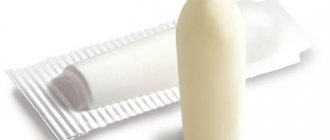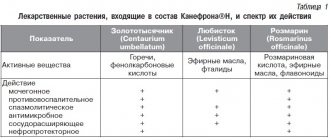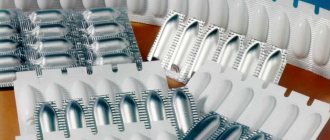Views - 25,404
Women often face such a delicate problem as hemorrhoids immediately after giving birth to a child. This disease causes a lot of unpleasant sensations and can seriously ruin the life of any new mother. It is impossible to delay the treatment of hemorrhoids, but the choice of means to get rid of it during lactation should be approached very carefully. Is it possible to use such a well-known drug as “Relief” while breastfeeding?
- The principle of action of the drug
- Is Relief safe while breastfeeding?
- Methods of taking the drug
- Is it possible to replace the drug with something?
Video - what are hemorrhoids and how to treat them?
Relief price
The cost of the drug depends on the form of release and the manufacturer. The table shows data on the cost of suppositories and ointments in different pharmacies in Moscow:
| Pharmacy name | Release form | Price, rubles |
| Pharmacy 36.6 | Rectal cream | 441 |
| Suppositories | 405 | |
| ZdravZone | Rectal ointment | 385 |
| Suppositories | 477 | |
| Elixir Farm | Rectal ointment | 399 |
| Suppositories | 356 | |
| heart | Rectal cream | 310 |
| Suppositories | 505 |
The information presented in the article is for informational purposes only. The materials in the article do not encourage self-treatment. Only a qualified doctor can make a diagnosis and make recommendations for treatment based on the individual characteristics of a particular patient.
How to use Relief while breastfeeding
Often after childbirth, mothers are faced with such a problem as hemorrhoids. It occurs as a result of swelling of the veins in the intestines. With recurrent pathology, the veins form hemorrhoidal nodules, which interfere with the natural normal act of defecation. Treatment of this pathology can be varied - surgical, conservative, folk remedies. The most common remedy is Relief. Can Relief be used while breastfeeding?
How it works
The drug has a vasoconstrictor and local anti-inflammatory effect. It has proven itself well as a wound healing agent. These properties are due to the presence in its composition of a combination of active substance and shark liver oil. Taken together, they have a high anti-inflammatory, hemostatic and wound-healing effect. In addition, cream and ointment can eliminate itching, reduce the production of exudate, and reduce swelling of surrounding tissues to alleviate the symptoms of hemorrhoids.
When is it prescribed?
The product is used for various types of hemorrhoids of different etiologies. In addition, it can be used:
- If you have anal itching.
- As a wound healing agent.
To use during lactation or not
According to the instructions for use, this drug is not prescribed during feeding. However, after consultation with a doctor, it can be prescribed to a nursing mother. It is believed that the active substance passes into breast milk in very insignificant concentrations, and therefore cannot harm the baby. In addition, no side effects from its use during breastfeeding in infants have been identified. The only time a drug is prohibited is:
the presence of an allergic reaction to shark liver oil, beeswax and cocoa bean butter. Most often this will manifest itself in the form of itching, hyperemia, rash
Therefore, when using the medicine, pay attention to all possible deviations in the health of the baby, the presence of problems with blood pressure in the newborn. During lactation, it is better to refrain from therapy with this drug, which contains phenylephrine.
This substance can cause changes in blood pressure in infants.
In other cases, excluding contraindications, Relief is approved for the treatment of nursing mothers.
Good analogues are:
These ointments and suppositories can be used only after consultation with a specialist, since only he can tell which drug is best for nursing mothers.
At the moment, the following popular and widespread analogues are distinguished:
- Relief ultra. Available only in the form of candles. It contains a steroid hormone that is produced by the adrenal cortex. It is classified as a combined remedy against hemorrhoids. Has a wound healing effect. It has anti-inflammatory, vasoconstrictor and antipruritic effects. When breastfeeding, it can be used only as prescribed by a doctor.
- Relief Advance. Available in the form of ointments and suppositories. It contains the active substance – benzocaine. It has a high wound-healing effect and anti-inflammatory effect. In addition, it is considered an excellent local anesthetic and immunomodulator. When breastfeeding, it is prescribed by a doctor after assessing all the risks.
- For hemorrhoids, Natalsid suppositories can relieve symptoms and cure the disease. It has a reparative, hemostatic, anti-inflammatory, hemostatic effect. In addition, it promotes rapid tissue regeneration. Natalsid is prescribed for the presence of anal fissures and chronic hemorrhoids. Natalsid suppositories are used after natural or forced bowel movement. According to the description in the instructions, a single dose of the drug is one suppository for 48 hours. When using Natalsid, there is no need to interrupt lactation - the product is safe for the health of the baby.
What to give preference to and which suppositories to choose from a wide range of antihemorrhoidal drugs in each case is decided by the doctor, based on the individual characteristics of the course of the disease. During lactation, self-medication is especially dangerous - because the health of the baby can also suffer. In addition, today there are no full-fledged studies of pharmacological agents on lactating women - insufficient knowledge explains the prohibitions on the use of the drug for breastfeeding that are often found in instructions. In this way, the manufacturer protects itself from possible adverse consequences. It is best to choose medications carefully, having studied all the pros and cons together with a medical specialist.
Is Relief safe while breastfeeding?
It is not so easy to cure hemorrhoids during breastfeeding, since a lot of drugs that are normally approved may have contraindications during lactation. Treatment should only take place under the supervision of a doctor, who prescribes medications and makes recommendations based on individual indications.
In most cases, “Relief” can be safely used during breastfeeding, but some of the components included in its composition can enter the baby’s body through mother’s milk. In this regard, you should strictly adhere to the dosages and treatment periods indicated by your doctor.
For example, shark liver oil or cocoa butter contained in some varieties of Relief can trigger the development of an allergic reaction in a baby. Another component included in the drug, phenylephrine, relieves swelling and constricts blood vessels, as a result of which the child’s blood pressure can significantly increase.
"Relief" is contraindicated for women suffering from high blood pressure, diabetes and hyperthyroidism.
How to treat hemorrhoids during lactation
Exacerbation of hemorrhoids is usually accompanied by sharp pain, especially when going to the toilet. Hemorrhoids after childbirth: treatment. To relieve pain, nursing mothers can take homeopathic medicines in the form of ointments, gels or suppositories. Various traditional medicine methods are also widely used to treat hemorrhoids in such situations. These can be the same candles and ointments, only they are prepared with your own hands from natural ingredients. Various sitz baths with herbal decoctions, douching, enemas, and beekeeping products, which are best used only after consultation with a specialist, effectively cope with the symptoms of hemorrhoids.
In addition, it is very important for a woman suffering from hemorrhoids to review her diet, adding more fiber and dairy products to it. Nutrition for pregnant women and mothers during lactation must be correct, prescribed by a doctor
This precaution will not cause unnecessary problems for the baby and will protect the health of the nursing mother herself. What drugs can be used against hemorrhoids in pregnant and lactating women?
Chemical properties
This form of the active substance has a whitish tint. It is found in the form of a crystalline powder that has no distinct odor. The component combines well with alcohol and water. The solution is administered through injection, but before that it is sterilized for half an hour at a temperature of 100°C.
This component is of synthetic origin. It is an alpha-adrenergic receptor stimulant. Molecular weight is 167 g. It begins to melt at temperatures above 134°C.

The active ingredient of the drug goes well with water.
Analogues of the product
The use of Relief after childbirth depends on the form of the disease:
- If a nursing mother's lumps are located closer to the anus, then ointment is prescribed. The instructions say that the medicine should be applied around the anus up to three times a day: in the morning, after bowel movements and in the evening.
- Ointments can also be used to treat internal hemorrhoids. Before performing manipulations, it is necessary to clean the intestinal tract. Then take the applicator, draw the product into it and carefully insert it into the rectum. After performing the manipulations, you should lie down for ten minutes. Then rinse the applicator with warm water.
- Suppositories are used to treat internal lumps. In appearance they resemble a torpedo. That is, one end has an angular shape, which allows you to carefully insert the candle into the anal passage. To carry out the procedure, the patient must lie on his left side. Release the medicine from the contour packaging and insert the suppository into the rectum. After this, lie down for another twenty to thirty minutes. The manipulations should be repeated up to three times a day.
The duration of treatment with this drug should not exceed seven days.
During the period of feeding the fetus, it is necessary to consult about the use of each individual drug. If negative manifestations occur, it can be replaced with the following medications:
- candles containing sea buckthorn;
- pure or diluted propolis;
- pork lard.
Before using them, you must consult your doctor.
Instructions for the introduction of suppositories and the use of ointment during lactation
Before using the medications, wash your hands and anus with soap. You cannot carry out procedures immediately before defecation. It is advisable to give a cleansing enema the day before. To insert the suppository, you need to lie on your back or side. The anus is first lubricated with Vaseline, then a suppository is inserted into the rectum 2-3 centimeters. In order for the medicine to be better absorbed, you need to lie down for a while after inserting the suppository.
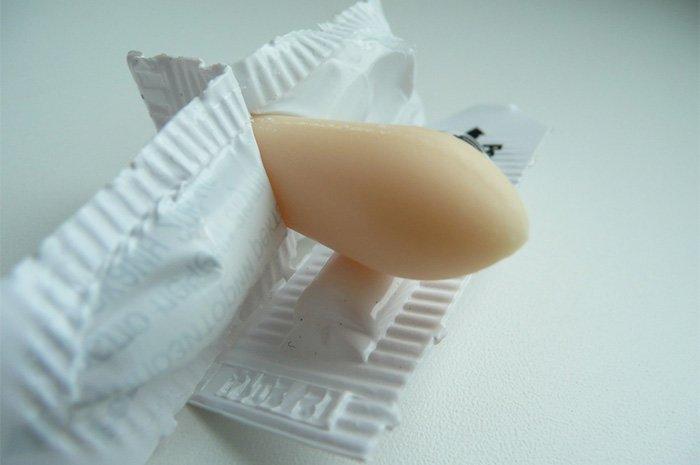
To apply the ointment to the affected area, you need to attach the special applicator included in the kit to the tube. It must be carefully inserted into the anus and the required dose of the product must be squeezed out. After this, you need to treat the area near the anus, wash the applicator and hands. Treatment of the anus with ointment is performed after each bowel movement and before bedtime. No more than 4 uses of the product are allowed per day.
Rules for using the drug
Let's consider the rules for taking both forms of the drug:
The ointment is applied externally to the surface of the anus, or you can use an applicator that is inserted internally. Distribute a thin layer over the anus 3-4 times a day and after bowel movements. First, you need to wash the perineum with warm water and wipe dry. For oral administration, use a special applicator, sold along with the product.
After applying a little ointment to the applicator, it is carefully inserted into the anus. After the procedure, the applicator must be thoroughly washed to remove any remaining ointment. Candles are made in the shape of a torpedo with a rounded end
If the suppository is stored in the refrigerator, warm it in your hands before inserting. Place candles in the morning and evening, as well as after bowel movements, but no more than 4 times a day. The duration of course use is one week.
How to use Relief while breastfeeding?
If a young mother has nodes inside the anus, then the drug should be used after each bowel movement, up to 4 times during the day. When hemorrhoids fall out, then the ointment should be applied to the dilated vein. Candles are also used as a preventive measure for hemorrhoids, placing one candle at night before bed or in the morning when a bowel movement occurs.
Before putting candles or applying ointment, a woman should wash her hands to avoid infection. Next, you should adhere to these recommendations:
- wash hands with soap;
- wash the area where the candle will be inserted;
- open the capsule, take out the suspension;
- the candle is inserted into the rectum carefully so as not to injure the anal passage;
- Take a horizontal position for a few minutes.
The drug should be stored in a dark place away from direct sunlight and out of reach of children.
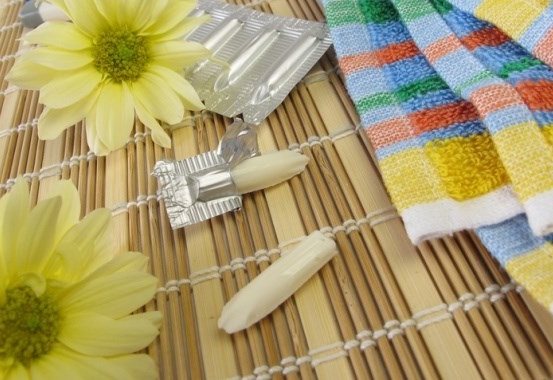
Sea buckthorn suppositories for hemorrhoids are also suitable for preventing constipation and are not dangerous to the health of the young mother and baby. The method of application depends on the form of release of the drug.
The use of the ointment must be carried out strictly according to medical prescription and according to the rules specified in the instructions:
- When breastfeeding, the ointment is applied around the anus.
- This should be done in the morning, after each trip to the toilet or before bed.
- The ointment must be applied to a special applicator, which is then inserted into the anus in order to properly treat the hemorrhoids. After this, the applicator must be thoroughly rinsed and dried.
Suppositories for hemorrhoids during breastfeeding are produced in the form of a torpedo. Application should take place in this order:
- Heat the candles. They should be at room temperature.
- You need to insert it inside with the rounded end, pointing it forward.
- Sometimes an applicator is used for this.
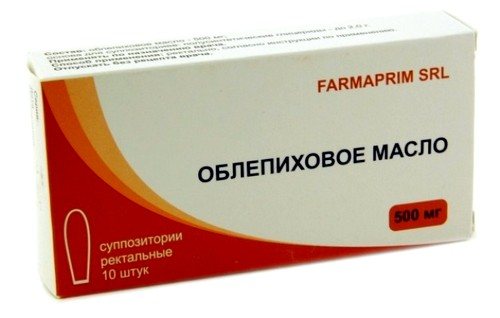
You can use sea buckthorn suppositories for hemorrhoids no more than 4 times a day, no longer than one week. Then the course is extended, if necessary, but only as prescribed by a doctor.
How to choose the best product
Treatment is prescribed by a doctor taking into account the severity of the disease. The choice of suppositories and ointments for hemorrhoids depends on the predominant symptom - bleeding, pain, itching, inflammation of the skin around the anus:
- For uncomplicated hemorrhoids, anticoagulants are indicated that dissolve formed blood clots and stop thrombus formation - suppositories with heparin (Hepatrombin G, Nigepan), heparin ointment.
- For severe pain syndrome, suppositories and ointments for hemorrhoids with anesthetics are indicated - lidocaine, neomycin, anesthesin, benzocaine, Cinchocaine, Lauromacrogol - these are pain-relieving suppositories Relief Advance, Emla (Lidocaine + Prilocaine cream), Proctosedyl M, Olestesin, Nigepan.
- In case of bleeding, it is advisable to use vasoconstrictors (relieve swelling), venotonic, hemostatic drugs - Phenylephrine hydrochloride, adrenaline, tribenoside (Relief, Procto-glivenol).
- When there is an inflammatory process around the anus on the skin, Ichthyol (ichthyols), Levomikol, as well as NSAIDs (non-steroidal anti-inflammatory drugs, see ointments for pain) are indicated, the most popular among them are Diclofenac and Ibuprofen suppositories. If inflammation is accompanied by itching and there are no contraindications to the use of corticosteroids, then you can use suppositories with hormonal agents - Proctosedyl, Gepotrombin G, Ultroproct, Aurobin ointment.
- Taking drugs orally - the most correct and effective treatment is combination therapy using both local remedies in the form of ointments and suppositories, and taking drugs orally - these are Troxevasin (Troxerutin), Diosmin (Vasoket 650-800 rubles, Phlebodia 650-820 rubles. ), Hesperidin + Diosmin (Detralex 700-800 rubles, Venarus 400-450 rubles, Venadiol 420 rubles). The course of treatment is at least a week. And also Ginkor Fort (30 caps. 400-500 rubles or gel) is a combination drug with ginkgo biloba extract, troxerutin, heptaminol.
To use during lactation or not
According to the instructions for use, this drug is not prescribed during feeding. However, after consultation with a doctor, it can be prescribed to a nursing mother. It is believed that the active substance passes into breast milk in very insignificant concentrations, and therefore cannot harm the baby. In addition, no side effects from its use during breastfeeding in infants have been identified. The only time a drug is prohibited is:
the presence of an allergic reaction to shark liver oil, beeswax and cocoa bean butter. Most often this will manifest itself in the form of itching, hyperemia, rash
Therefore, when using the medicine, pay attention to all possible deviations in the baby’s health; presence of blood pressure problems in the newborn. During lactation, it is better to refrain from therapy with this drug, which contains phenylephrine.
This substance can cause changes in blood pressure in infants.
In other cases, excluding contraindications, Relief is approved for the treatment of nursing mothers.
Effect of the drug
The effectiveness of the drug is due to the activity of its components, which provide anti-inflammatory, vasoconstrictor and wound healing effects.
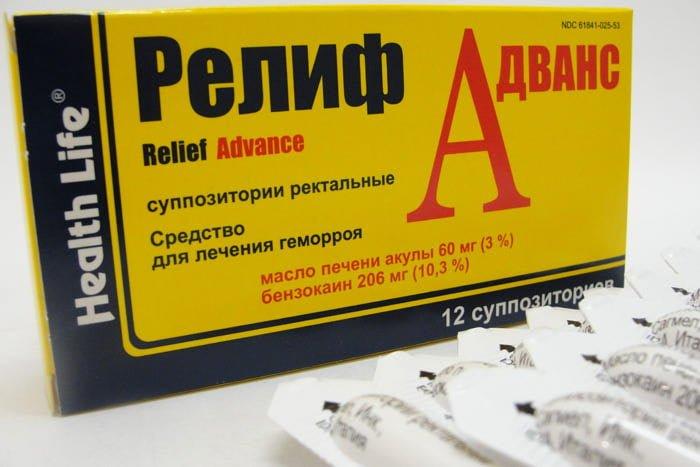
On a woman's body
The drug Relief has proven itself on the positive side. Judging by the reviews, it has the following effects on the body:
- Phenylephrine hydrochloride helps to constrict hemorrhoidal vessels and relieve swelling, it also stops bleeding and reduces itching.
- Shark liver oil improves blood circulation, activates the immune system, reduces inflammation and reduces pain.
- Vitamins E and A accelerate tissue repair.
- The candles contain cocoa butter, corn starch and preservatives. These components accelerate wound healing.
- The ointment softens the mucous membrane and promotes tissue regeneration thanks to the content of petroleum jelly, beeswax, thyme oil and vitamin E.
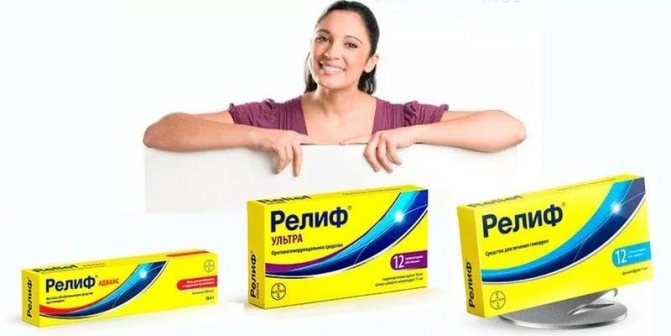
Does it affect lactation and the baby?
Experts say that the components of the local drug are absorbed into the blood. Consequently, the components of the drug Relief enter the child’s body in small quantities through breast milk.
However, doctors reassure nursing mothers that this can be dangerous only in two cases: the drug is used for too long or the recommended dosage is exceeded.
If the recommendations are followed, Relief does not have a negative effect on the child and the quality of lactation, and it can be used. An exception is the drug Relief Ultra. It is better to avoid it during breastfeeding.
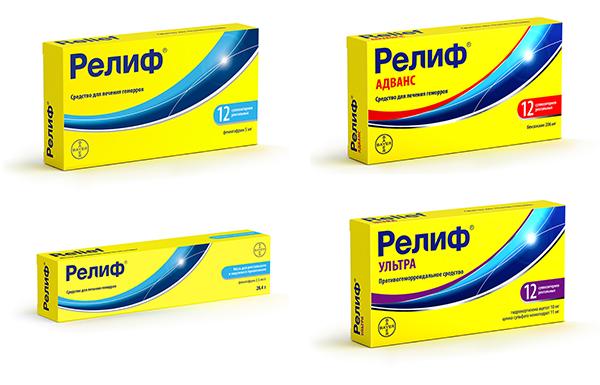
Analogs and price
The drug from the Relief series is expensive. The average price ranges from 390-430 rubles. Not every woman will decide to spend that amount on treatment.
But pharmacy kiosks offer safer and cheaper products for breastfeeding women in the form of:
- sea buckthorn candles. The price of the drug ranges from 110-140 rubles;
- suppositories with propolis. The average cost is 80 rubles;
- glycerin suppositories. The drug costs about 200 rubles;
- Neo-Anuzola. The cost ranges from 90-120 rubles;
- Posterized. Compared to other medications, it is expensive. It costs around 370 rubles. But it has a complex effect, just like Relief.
Relief is an excellent remedy against hemorrhoids. Breastfeeding is not a contraindication, but only a doctor should prescribe it, since it is considered prohibited for children. When prescribing, you should follow all the doctor’s recommendations.
What medications are suitable after completion of lactation?
Once you've finished breastfeeding your baby, you don't have to limit yourself in the ways you can combat hemorrhoids. The doctor may prescribe you Detralex, which has the ability to thin venous blood, thereby preventing the formation of nodes. There are also good analogues of Relief, such as “Neo-anuzol” and “Natalsid” in the form of suppositories, “Posterizan” suppositories and ointments, “Gepatrombin G” and “Proctosedyl”, “Procto-Glivenol”, produced in the form of cream and suppositories . All products are used only under the supervision of a physician.
During pregnancy or during childbirth, women very often suffer from hemorrhoids. There is a high probability of developing this insidious disease after the birth of the baby, during lactation. In such situations, you have to be more careful about treatment methods and the choice of medications. And this is no coincidence, because most medications have contraindications for such patients.
But hemorrhoids cannot be ignored, in any way, and postponing treatment until better times is also not an option. To put it bluntly, hemorrhoids are essentially varicose veins of the rectum. If hemorrhoids that appear for the first time after childbirth are not so terrible, then an old disease that has worsened during lactation will require a more serious attitude and long-term treatment.
Relief Advance
Release form, composition and packaging
The ointment for rectal and external use is homogeneous, white with a yellowish tint, with a weak, peculiar odor, and does not contain foreign inclusions.
1 year
shark liver oil 30 mg. (3%)
benzocaine 200 mg. (20%).
Excipients: mineral oil, petroleum jelly, propylene glycol, methylparaben, propylparaben, sorbitan monostearate.
Rectal suppositories are white or white with a yellowish tint, torpedo-shaped.
1 sup. shark liver oil 60 mg. (3%)
benzocaine 206 mg. (10.3%)
Excipients: cocoa bean butter, solid fat, methyl parahydroxybenzoate, propyl parahydroxybenzoate, corn starch.
Clinical and pharmacological group: A drug with anti-inflammatory and local anesthetic effects for local use in proctology.
pharmachologic effect
Antihemorrhoidal drug.
Shark liver oil, due to the fat-soluble vitamins and alkoxy-glycerol it contains, has anti-inflammatory, hemostatic, wound-healing and immunomodulatory effects.
Benzocaine is a local anesthetic and has no resorptive effect.
The base of the suppositories - cocoa butter - has an additional softening effect.
Pharmacokinetics
Data on the pharmacokinetics of the drug Relief Advance are not provided.
Indications
- treatment of external and internal hemorrhoids;
- anal fissures;
- anal itching;
- for the purpose of pain relief after proctological operations.
The drug in the form of an ointment is also used for erosions of the anus and during diagnostic procedures.
Dosage regimen
The drug should be used after hygiene procedures.
Suppositories are inserted into the rectum in the morning, at night and after each bowel movement. Adults and children over 12 years of age are recommended to administer 1 suppository up to 4 times a day.
To use the ointment, remove the protective cap from the applicator, attach the applicator to the tube and squeeze out a small amount of ointment to lubricate the applicator. The ointment is carefully administered using an applicator up to 4 times a day (morning, afternoon and evening and after each bowel movement).
After each use, rinse the applicator thoroughly and place it in the protective cap.
For children under 12 years of age, the drug is prescribed under medical supervision.
Side effect
Local reactions: hyperemia, itching. Allergic reactions are possible.
Contraindications
- thromboembolism;
- granulocytopenia;
- hypersensitivity to the components of the drug.
Pregnancy and lactation
The drug Relief Advance is used during pregnancy and lactation (breastfeeding) with caution and only if the expected benefit to the mother outweighs the potential risk to the fetus or child.
special instructions
In case of accidental ingestion, you should immediately seek qualified help.
If there is heavy bleeding from the rectum or if painful symptoms persist for more than 7 days, you should additionally consult a proctologist.
Use in pediatrics
The question of prescribing Relief Advance for children under 12 years of age should be decided individually, depending on the clinical situation.
Overdose
Possible symptoms may be associated with systemic absorption of benzocaine, which is part of the drug, and include drowsiness, anxiety, agitation; in severe cases - convulsions; extremely rarely - methemoglobinemia (manifested by respiratory problems and cyanosis).
If the recommended single and daily doses of shark liver oil included in the drug are significantly exceeded, a tendency to increased blood clotting may develop.
Treatment: for methemoglobinemia - intravenous administration of methylene blue.
Drug interactions
Drug interactions with Relief Advance have not been described.
Storage conditions and periods
The drug should be stored in a dry place, protected from light, out of reach of children, at a temperature not exceeding 27°C. Shelf life: 2 years.
Contraindications
Instructions for use of Relief indicate that suppositories and ointment should not be taken if:
- arterial hypertension;
- diabetes mellitus;
- individual sensitivity to components;
- granulocytopenia.
The local drug enters the bloodstream in a minimal amount, so it is almost absent in mother’s milk. A qualified doctor will select the dosage for the patient that is acceptable for breastfeeding. But there are times when you have to refuse the drug. Relief during lactation is not allowed to be used if:
- fungal or viral infection;
- thromboembolic disease;
- decreased level of granulocytes in the blood;
- tuberculosis;
- some pathologies of the endocrine system;
- renal water loss;
- arterial hypertension;
- neoplasms of various types;
- disturbances in the functioning of the hypothalamic-pituitary system.
In any other situations, the product is used with caution. Many women develop hemorrhoids after childbirth
Almost 60% of nursing mothers suffer from this unpleasant disease. To cope with hemorrhoids, many experts recommend using Relief
Many women develop hemorrhoids after childbirth. Almost 60% of nursing mothers suffer from this unpleasant disease. To cope with hemorrhoids, many experts recommend using Relief.
Doctors do not recommend taking Relief and Relief Advance suppositories if hypersensitivity to the components of the drug, granulocytopenia, or thromboembolic disease is detected. Relief Ultra suppositories are contraindicated for use if a fungal, viral or bacterial infection is detected in the area of administration of the drug. Also, you should not use Relief Ultra under the following conditions:
- tuberculosis;
- severe forms of diabetes mellitus;
- hypernatremia;
- neoplasms of the anorectal zone;
- Itsenko-Cushing syndrome.
Neither suppositories nor ointment should be used by nursing mothers if they are diagnosed with:
- Susceptibility to the components of the drug.
- Diabetes.
- Manifestations of viral infections in the area of application of the drug.
- Thromboembolism.
- Granulocytopenia.
- high blood pressure;
- diagnosed diabetes mellitus;
- individual intolerance to the components that make up the drug was recorded in the human body;
- granulocytopenia.
What Relief is prescribed for during breastfeeding and why?
Relief is prescribed to a nursing mother in the form of suppositories or as an ointment. The form of the drug depends on the severity of the disease. Several types of medication are also available, differing in composition and main action:
- Relief – suppositories and ointment with a hemostatic effect;
- Relief Advance - has an additional analgesic effect;
- Relief Ultra is an anti-inflammatory drug that contains a hormonal component.
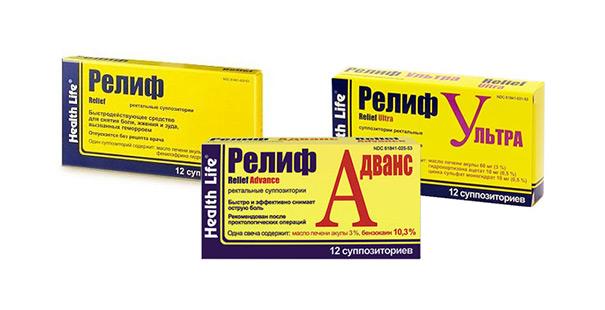
Relief candles and ointment
Yellowish elongated suppositories are used in the treatment of acute or chronic hemorrhoids; they are effective in the first and second stages of the disease. Thanks to the active components of Relief, it reduces pain, restores damaged tissue, constricts blood vessels, stopping bleeding.
The ointment is prescribed if prolapse of hemorrhoids has already occurred. It softens bumps, relieves inflammation and heals cracks.
Relief Advance suppositories and ointment
These drugs do not contain phenylephrine, but benzocaine, which is known for its analgesic effect. They are prescribed for the chronic course of the disease, to relieve severe pain.
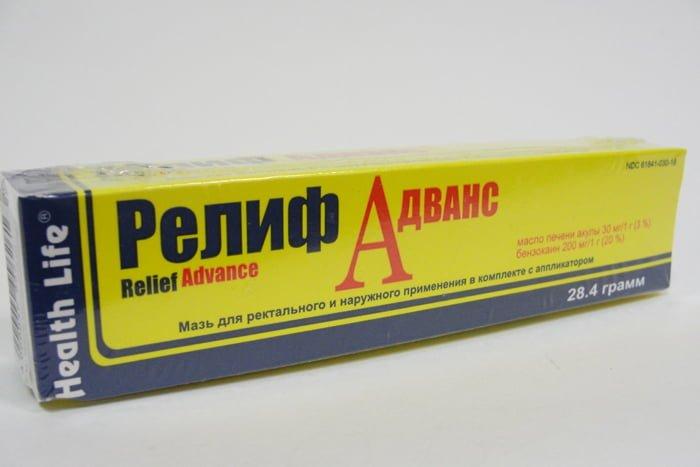
Relief Ultra candles
Relief Ultra suppositories contain a hormonal substance - hydrocortisone. It has a strong anti-inflammatory, vasoconstrictor and antihistamine effect. The medicine relieves pain, itching and swelling well. Another active component of the drug is zinc, which effectively restores affected tissue areas.
Relief Ultra suppositories are contraindicated for use during breastfeeding. If their use in treatment is necessary, breastfeeding is interrupted for the period of treatment.
Contraindications
Medicines with this component are not prescribed to all patients.
There is a whole list of restrictions in the form:
- high pressure;
- hypertrophic obstructive cardiomopathy;
- decompensated heart failure;
- atherosclerosis;
- severe ischemic disease;
- arterial damage;
- disturbances in the production of tears;
- hyperthyroidism;
- hepatic porphyria;
- angina pectoris;
- hypertensive crisis.
Medications are prescribed with caution to patients with diabetes mellitus, hypoxia, bradycardia, and angle-closure glaucoma. Medicines containing phenylephrine hydrochloride should be prescribed with caution to patients with diabetes mellitus.
Medicines containing phenylephrine hydrochloride should be prescribed with caution to patients with diabetes mellitus.
When the drug is contraindicated
It is generally accepted that drugs used locally do not enter the general bloodstream, being absorbed only into small areas of the intestinal mucosa. However, they penetrate into the bloodstream of a nursing mother, but in very small quantities. Naturally, once in the mother’s blood, the components of the medicine pass into breast milk, and through it to the baby. If you scrupulously adhere to the prescribed dosage during lactation, there will be no danger to the baby. There are special contraindications that prohibit the use of the product during breastfeeding. Experts include:
- The child's tendency to allergies. Shark liver oil and cocoa can cause a reaction that is manifested by itching, redness, and a rash on the baby’s skin. Monitor how your treasure reacts to treatment with Relief; if you notice a negative reaction, stop taking the product.
- Problems with blood pressure in a child. Do not use the basic version of the drug containing phenylephrine. The vasoconstricting component can cause blood pressure problems in the baby. If you use other types of medication, you should consult your doctor.
According to the instructions attached to the drug, the manufacturer must prescribe all the options in which it cannot be used. The list of main contraindications looks like this:
- arterial hypertension;
- diabetes;
- individual intolerance to various substances of the drug;
- problems with the hematopoietic system or granulocytopenia.
How it works and what it treats: areas of application
Before using any medications during lactation, you should first consult with a specialist. This is due to the fact that each individual drug from the Relief line has a different focus and principles of action.
Relief
The main components of the drug are effective:
- destroy the infection;
- constrict blood vessels;
- regenerate tissues;
- improve local immunity.
This drug is prescribed to nursing mothers not only to reduce pain, itching and discomfort in the perianal area, but also to get rid of other troubles (constipation, etc.). The product perfectly eliminates the following problems:
- cracks;
- anal itching;
- inflammation of the intestinal mucosa;
- pain in the anal area after surgery;
- haemorrhoids.
The drug is often prescribed to women before conducting various types of research.
Relief Advance
Relief Advance suppositories and ointment include six main components:
- Shark liver oil, which eliminates inflammation.
- Phenylephrine, which constricts blood vessels and normalizes blood flow.
- Cocoa butter and petroleum jelly, which facilitate the insertion of suppositories and reduce inflammation and itching.
- Benzocaine, which has an anesthetic effect.
- Zinc sulfate, healing the mucous membranes of the damaged area.
- Hydrocortisone acetate, which relieves itching and reduces swelling.
Relief Advance treats hemorrhoids and fissures, eliminates discomfort at the site of inflammation.
Relief Ultra
The substances in the drug help reduce the inflammatory process, heal affected tissues and strengthen local immunity. Due to these qualities, the medicine is recommended for the treatment of hepatitis B:
- varicose veins of hemorrhoids;
- proctitis;
- cracks;
- perianal dermatitis;
- itching of the anus.
Nursing mothers should use the product under the supervision of a specialist.
Relief Pro
The components of the drug determine its pharmacological properties. Lidocaine numbs the affected area. Fluocortolone reduces the risk of infiltration, weakening the allergic reaction and reducing discomfort. Long-term use of the product while breastfeeding is dangerous for the body and is allowed only in cases of proctitis, eczema or hemorrhoids.
How does the disease manifest itself?
Hemorrhoids can be acute or chronic.
In its acute form, the disease develops very quickly:
- Women begin to experience burning and itching in the anus. When you try to empty your bowels, sharp pain occurs and the discomfort intensifies.
- Some people, because of such sensations, begin to be afraid to go to the toilet and delay bowel movements. This causes hemorrhoids to become even larger, and nearby tissues become red and very swollen. It becomes painful not only to sit, but also to walk. The condition is deteriorating sharply.
- Hemorrhoids from tension during toileting begin to fall out of the rectum and do not always return to their place. They need to be adjusted manually, which is very difficult and brings a lot of inconvenience.
- Sometimes the nodes rupture and severe bleeding begins. And if an infection gets into the gap, pus begins to accumulate there and such inflammation is almost impossible to cure without the help of a surgeon.
The chronic form is not always noticeable for a woman:
- sometimes she feels a slight burning or itching, which quickly passes after defecation;
- the symptoms sometimes become aggravated, but quickly subside, so they do not cause much concern.
With the slightest favorable factor, the chronic form of hemorrhoids develops into acute, so if you feel these signs, you should definitely see a proctologist.
Hemorrhoids can be easily identified by the condition of the anus. An experienced doctor will immediately notice external nodes, and diagnose internal ones by examining the end of the colon.
Treatment should be started as early as possible, without triggering the disease, because the use of potent drugs can harm the baby.
It is worth remembering that medications can pass into mother’s milk and from it to the baby, which is extremely undesirable. Some drugs worsen the quality of milk, and sometimes even completely provoke its disappearance.
Therefore, until lactation is over, it is better to be treated with conservative, gentle methods. And under no circumstances should the disease progress until surgical intervention is necessary.
Description
The Relief line of drugs copes well with a delicate problem and does not require specific skills to use. The components of the drug come into close contact with the affected tissues and have a healing effect on them as quickly as possible. The consistency and dose of the medication is determined based on the form of the pathology and the characteristics of the patient’s body.
To begin with, it must be said that hemorrhoids do not appear in all pregnant women or women who have given birth.
It is important to know that the development of the disease is not affected by varicose veins. Just like young mothers with varicose veins do not always suffer from prolapse of hemorrhoids
In principle, the cause of this disease is often constipation of a long-term nature. Fecal matter inside the body creates pressure on the veins, causing bleeding. If this process occurs regularly, then the cones (nodes) become larger and larger.
Hemorrhoids can be internal or external. Most often, the disease manifests itself in the form of blood clots during bowel movements, pain during bowel movements and constipation. Women can detect prolapsed hemorrhoids on their own.
The drug is produced in the form of rectal suppositories and ointments. Candles of a yellowish hue in the shape of a torpedo with a subtle smell of fish have the following composition:
- phenylephrine hydrochloride;
- shark liver oil;
- cocoa butter;
- starch;
- para-hydroxybenzoic acid methyl ester;
- para-hydroxybenzoic acid propyl ester.
The second dosage form of Relief is an ointment that contains the following components:
- phenylephrine;
- shark liver oil;
- mineral oil;
- petrolatum;
- para-hydroxybenzoic acid methyl and propyl ester;
- sheep wax;
- preservative E210;
- corn oil;
- glycerol;
- lanolin alcohol;
- paraffin;
- distilled water;
- thyme oil;
- tocopherol;
- white wax.
Suppositories are used for mild forms of hemorrhoids, when hemorrhoids are located in the anus. And the ointment is prescribed in severe cases, when the nodes have already fallen out. Both dosage forms constrict blood vessels, eliminate itching, and reduce swelling.
Hemorrhoids are often accompanied by constipation. When it is difficult to defecate, the pressure in the rectum increases, as a result, blood fills this area and the intestinal vessels swell. When the scenario is repeated several times, the veins stretch and hemorrhoids form.
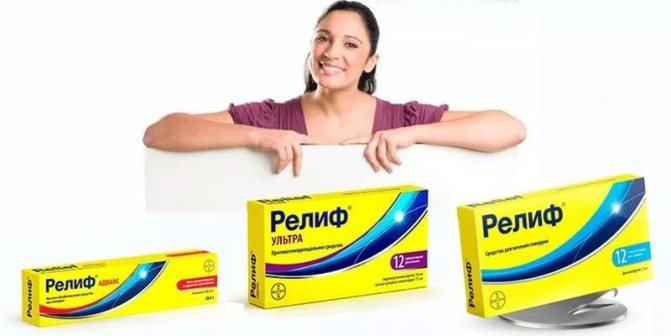
This phenomenon provokes pain and sometimes even bleeding. If a pregnant woman suffered from hemorrhoids, the problem will only worsen after the birth of the child. If left untreated, the likelihood of hemorrhoidal cones falling out of the anus increases.
Complications of hemorrhoids:
- Thrombosis of the hemorrhoid. The inner lining of the rectum becomes inflamed and swollen. When defecation is difficult, a spasm of the anal sphincter occurs, which compresses the hemorrhoidal cones. As a result, blood circulation is impaired and the likelihood of thrombosis, which can transform into necrosis, increases.
- Paraproctitis. With advanced hemorrhoids, there is a risk of developing purulent inflammation, which destroys the tissue of the rectum. And this is dangerous for human life.
In what cases is the drug prescribed for hepatitis B?
Constipation is considered the main cause of hemorrhoids. With irregular bowel movements, the pressure inside the rectum increases during bowel movements, which increases blood flow and leads to swelling of the intestinal veins. This threatens the formation of a hemorrhoid.
During pregnancy, a woman has an increased risk of developing hemorrhoids due to squeezing of blood vessels and pushing. After childbirth, women often experience prolapse of hemorrhoids. This condition is almost always accompanied by pain and even bleeding.
If the disease is neglected, complications such as thrombosis or purulent inflammation may occur.
Relief is prescribed by specialists as an effective remedy for hemorrhoids at any stage. However, during breastfeeding, its use is possible only after a thorough examination of the nursing mother and taking into account her individual characteristics.
Suppositories against hemorrhoids during breastfeeding
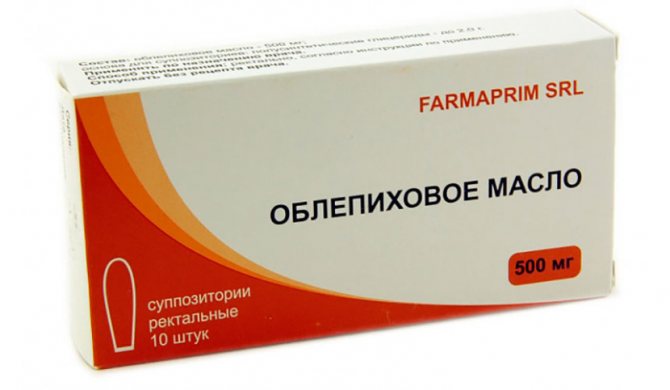
Women after childbirth while breastfeeding are prescribed suppositories for hemorrhoids, depending on the degree of the disease and the characteristics of its development:
- An excellent remedy for inflammation of the rectum during lactation are suppositories with propolis. They are sold in pharmacies, but you can make them yourself. To prepare it yourself, melt and mix the butter and propolis in a steam bath. Next, the resulting mass is poured into molds; if there are none, then this mixture is formed into a thin rod by hand and wrapped in food grade polyethylene. To fix the resulting shape, it is cooled in the freezer. Such inexpensive suppositories for nursing with propolis help eliminate the inflammatory processes of hemorrhoids, reduce the feeling of itching and reduce pain. Since propolis is an absolutely natural substance, breastfeeding mothers with breastfeeding do not have to worry about their health or the health of their baby.
- A wonderful remedy for hemorrhoids during lactation are sea buckthorn suppositories. Thanks to the use of natural ingredients, these products are completely safe for health. Rectal suppositories with calendula have the same properties. The only drawback that these drugs have is that they have the maximum therapeutic effect only at the initial stage of the disease. These suppositories successfully extinguish inflammatory processes and heal wounds.
Also safe for the baby and mother during lactation are suppositories for hemorrhoids called Posterisan, Nise, Procto Glivenol and Movalis. They not only have an effect on inflamed hemorrhoids and help relieve swelling, but also act as a pain reliever.
- Natalsid is made from natural ingredients. Main composition: solid fat (vitepsol) and seaweed extract – sodium alginate polysaccharide. It has a healing effect on wounds and microcracks in the anus. Rectal suppositories called Natalsid are safe during lactation and are used to restore the integrity of the intestinal mucosa.
- Methyluracil suppositories are also popular during breastfeeding. They are a high-quality immunomodulatory agent that ensures the restoration of the intestinal mucosa and eliminates the causes of bleeding.
- Gepatrombin G is a completely safe suppository during lactation for both mother and child. They are used to eliminate inflammation, reduce pain and itching. Helps relieve swelling of nodes.
Relief candles for breastfeeding
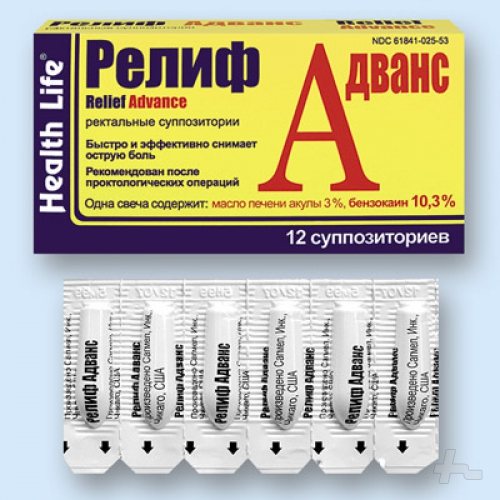
This is the most effective hemorrhoid drug for nursing mothers. Several rectal medications are produced under this brand - these are classic suppositories, Advance and Ultra. The natural main component is shark liver oil. The products in this series are excellent for stopping the development of inflammatory processes, blocking pain, healing microcracks and wounds. Each type of medicine is used depending on which symptoms of the disease manifest themselves most. For example:
- If during lactation there is severe swelling of the hemorrhoids, then it is recommended to use suppositories that contain phenylephrine, which has a vasoconstrictor effect.
- In case of severe pain, it is appropriate to use Relief Advance suppositories containing benzocaine, which has an analgesic effect.
- rectal suppositories for hemorrhoids during breastfeeding Relief Ultra remarkably relieve itching and reduce bleeding, help relieve swelling of hemorrhoids.
When choosing the best suppositories for hemorrhoids while breastfeeding, women should first consult a specialist. Only he can determine what type of medicine should be used for hemorrhoids during lactation, so as not to harm the health of the woman and baby.
Can women use Relief while breastfeeding?
Hemorrhoids manifest themselves in the fact that blood, pain or constipation may appear during bowel movements. Sometimes women can detect prolapsed hemorrhoids on their own. It is possible to treat the disease during breastfeeding, but the therapy will be specific. Feeding a child can be combined with taking a drug such as Relief.
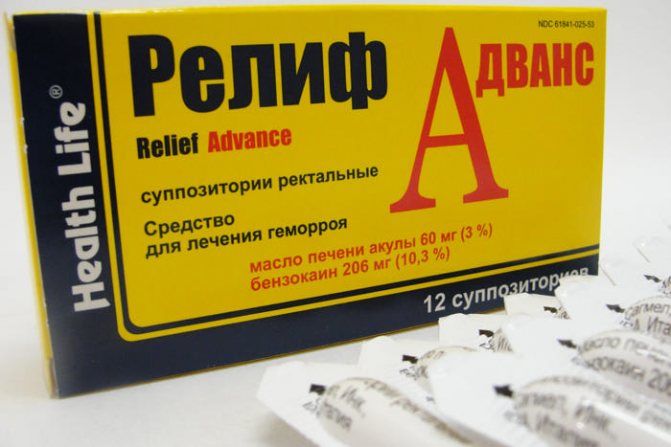
This medicine is available in the form of ointments or suppositories. Relief during lactation is allowed to be used by mothers due to the fact that the drug contains plant raw materials, represented by sea buckthorn oil. Considering that in the pharmacy you can find several types of the drug Relief, which is used during lactation, you cannot buy the medicine yourself without a doctor’s prescription. Most often, doctors prescribe the following types of drug:
- Relief Advance;
- Relief Ultra.
A gynecologist can prescribe one type or another, as well as the form of administration - suppositories or ointment, after conducting an examination after childbirth. In this case, the duration of taking the drug, which includes shark liver oil, phenylephrine (active substance), thyme oil, petroleum jelly, natural corn oil and other components, is determined. Both ointment and suppositories effectively relieve inflammation, eliminate swelling, itching and burning, bleeding, and heal wounds and cracks.
For breastfeeding (breastfeeding), Relief for hemorrhoids is prescribed because of its properties and the effective results that the medicine demonstrates. Among the properties are the following:
- wound healing;
- immunomodulatory;
- anti-inflammatory;
- hemostatic;
- painkillers.

Both Relief candles and ointment are produced, which are suitable for internal and external use. Suspensions are used in cases where hemorrhoids are located internally, and ointment is used for external hemorrhoids.
Relief Advance contains a local anesthetic called benzocaine. It helps relieve acute pain, and Relief Ultra contains a hormonal component and zinc, which are effective in cases where the nodes begin to bleed.
Suppositories for hemorrhoids during breastfeeding are prescribed not only because of its properties and composition, but also because of the positive and long-lasting effect. Relief works well against hemorrhoids both during childbirth and during breastfeeding. The drug prevents the formation of new nodes.
Why does childbirth provoke hemorrhoids?
If the problem of hemorrhoids appears, you need to find out the factors that caused the disease. Some of them can be eliminated and then it will be easier to deal with the symptoms of the disease:
- constipation;
- lack of vitamins;
- poor nutrition;
- taking hormonal medications;
- lifting heavy objects;
- pathology of the venous walls.
In pregnant women, the uterus greatly enlarges and begins to compress the pelvic veins. When labor begins, during pushing, the pressure on the walls of the veins increases greatly and this causes hemorrhoidal cones.
At first they are located inside the colon, and over time they appear externally.
Hemorrhoids located inside the anus often lead to bleeding, so during the postpartum period women often suffer from anemia associated with this phenomenon. This significantly worsens the condition of the young mother and can negatively affect lactation.
External hemorrhoids are identified immediately by the rim around the anus. It is often accompanied by cracks near the anus, which can easily become infected and cause inflammation.
Side effects and contraindications
Before starting treatment, you should familiarize yourself with the contraindications of the drug. There are several cases when it is recommended not to use this medicine while breastfeeding:
- diabetes;
- arterial hypertension;
- individual intolerance to the components of the drug;
- granulocytopenia.
- neutropenia.
Treatment with Relief during breastfeeding can cause the development of the following side symptoms:
- hypertension;
- burning, irritation;
- allergy;
- hypercoagulation (high blood clotting);
- dizziness;
- bradycardia;
- headache;
- periodic itching;
- cyanosis of the skin and lips;
- respiratory dysfunction;
- rash on the body.
Side effects
Treatment of hemorrhoids should not be delayed to avoid possible complications. However, self-medication while breastfeeding is also unsafe. Only a doctor can prescribe medications and monitor the progress of treatment.

Some components of this medicine (shark liver oil, cocoa) are allergenic substances and can cause a rash, redness of the skin, and an allergic cough in a child. Phenylephrine has the ability to increase blood pressure, which may result in restlessness, crying, and sleep disturbances.
If any signs of an allergic reaction appear in an infant, the use of Relief should be stopped immediately.


